Movie Review – Wyatt Earp (1994)
Lumbered with a plethora of characters, some of whom just don’t work and some of whom are excellent, Wyatt Earp is directed with terrific visual style by Lawrence Kasdan; it’s the Western’s Western, a “definitive” insight into the famous lawman’s controversial life, and whether any or all of it is true probably isn’t the point as much as making it a great story.
– Summary –
Director : Lawrence Kasdan
Year Of Release : 1994
Principal Cast : Kevin Costner, Dennis Quaid, David Andrews, Jeff Fahey, Mark Harmon, Michael Madsen, Catherine O’Hara, Bill Pullman, Tom Siezemore, Isabella Rossellini, JoBeth Williams, Rex Linn, Linden Ashby, Adam Baldwin, Mare Winningham, Jim Caviezel, Téa Leoni, John Lawlor.
Approx Running Time : 191 Minutes
Synopsis: The biographical story of legendary Western Lawman Wyatt Earp, who, along with his brothers and their families, stamped their imprint all over the burgeoning frontier in the heydey of the Cowboys.
What we think : While it may be hampered by a somewhat leaden script, and a bloated running time, as well as a kinda-clunky leading performance by Costner, Wyatt Earp remains perhaps the more personal of the two modern films to tackle the subject. Lumbered with a plethora of characters, some of whom just don’t work and some of whom are excellent, Wyatt Earp is directed with terrific visual style by Lawrence Kasdan; it’s the Western’s Western, a “definitive” insight into the famous lawman’s controversial life, and whether any or all of it is true probably isn’t the point as much as making it a great story.
**********************
The mid 90’s was a great time for the Western in Hollywood. In 1993, Kurt Russell’s biopic based on the life of Wyatt Earp was released to modest returns, while barely 6 months later, Kevin Costner’s widescreen epic retelling of the same historical figure made a sharp loss against its cost. Often compared, but never really in the same class as each other, both Tombstone and Wyatt Earp are two films about the same person that couldn’t be more different. Tombstone, which featured Kurt Russell as a genuine fire-and-brimstone Western lawman (who can forget the famous line: “you tell ’em I’m coming, ya hear? You tell ’em I’m comin’, and hell’s comin’ with me!”) felt more like an action movie with Western influences than a standard bio-pic, a factor which perhaps made it more accessible to the general public looking for a rock-’em, sock-’em film. Wyatt Earp, which had then-white hot Kevin Costner in the leading role, was more nuanced and slanted towards those seeking a more truthful visit into that era of American frontierism. It was less focused on action, and more intent on delving into the motivations and problems encountered by Earp during his life, which perhaps didn’t strike as great a chord with audiences as either Costner or director Lawrence Kasdan might have hoped. But is it wrong to believe that Tombstone is the better of the two Earp films of that era? With the benefit of time, perhaps 1994’s Wyatt Earp isn’t as bad as the budgetary losses, the Razzie awards or the critical panning might indicate…. is it?
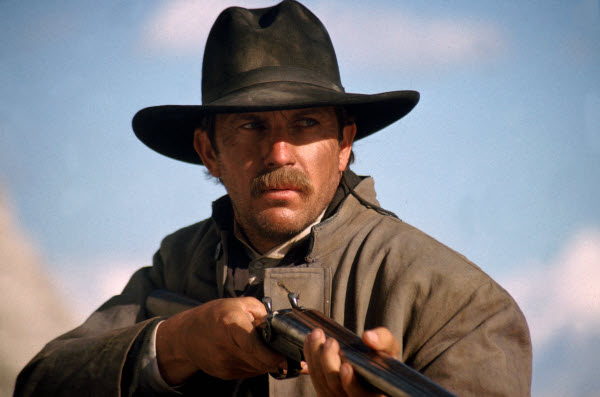
The film tells the story of the formative years of one Wyatt Earp, played as an adult by Kevin Costner, and his brothers Morgan (Linden Ashby) and James (David Andrews) – and their families – as they set about moving west with their father (Gene Hackman). After encountering a bully, Wyatt smacks him down and earns a reputation as a bit of a hard-man, which inevitably leads him to be called to duty as a lawman, namely, the deputy of Wichita, Kansas. Together with his brothers, including older brother Virgil (Michael Madsen) and two friends, Bat and Ed Masterson (Tom Sizemore and Bill Pullman, respectively) Wyatt sets about cleaning up Wichita, using methods many call harsh and often dictatorial. However, as news of his ability to maintain the peace spreads, Wyatt is offered the job of being Sheriff of Dodge City, an offer which eventually goes sour as Earp builds on his hard-man reputation – the town council eventually finds Earps methods hard to stomach, so they fire him. Wyatt meets and befriends a tuberculosis-ridden gunslinger named Doc Holliday (Dennis Quaid), with whom he and several of his brothers engage in a showdown with members of an outlaw gang run by Ike Clanton, at the infamous OK Corral. While he’s a lawman, Wyatt’s hard-nosed attitude to everyone aside from his brothers rankles those close to the family; especially his wives (played by Mare Winningham and Joanna Going) who find him to be too distant to relate to with any worthwhile meaning.
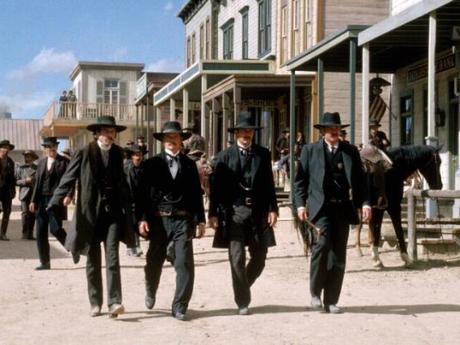
The early 90’s were pretty damn good to Kevin Costner. While he’d appeared in a string of decent box office successes in the 80’s, it wasn’t until Dances With Wolves in 1990 that Costner became the box office superstar who went on to give Robin Hood an American accent, unearthed the truth about the JFK assassination, and romance Whitney Houston, before almost sinking Universal with mega-flop Waterworld in 1995. Those four films cemented Costner as a genuine leading man in Hollywood, which would allow him to pick and chose his own projects; 1994’s Wyatt Earp, a film released almost simultaneously with Kurt Russell’s Tombstone, remains an unequivocal epic, even if critical plaudits have remained mysteriously absent. Costner’s revitalization of the American Western movie, which began with Dances With Wolves, would conclude with the superb Open Range in 2003, although I think Wyatt Earp is equally as valid an effort as either of those others.
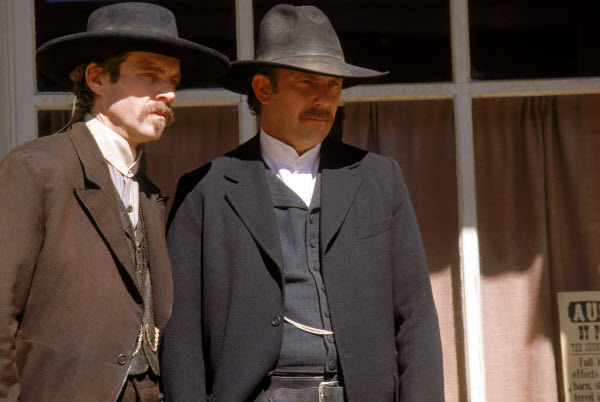
Dramatizing the life of a historical figure is always fraught with danger. On the one hand, most films have to compress time, compromise or even combine characters, pare away many motivations and sidebars to the main plot, in order to tell their story within a 2 hour running time. A bio pic, especially those depicting people of a time now long since passed, is usually a distillation of the essentials, which seeks to impart the most important elements of a person while trying to keep things entertaining. A figure as revered as Wyatt Earp, who dominates the Western genre much like Abraham Lincoln still resonates through US politics like some demi-god, has always been ripe for depiction on screen, although having two depictions within a calendar year released on screen was something of a good fortune to Western buffs. Costner, who was aligned with the Tombstone production until he had a falling out with screenwriter Kevin Jarre, decided to go it alone with his own version of the story – one which relied more on fleshing out the historical back-story of the man instead of relying on the action-oriented elements favored by Jarre – and teamed with writer/director Lawrence Kasdan to produce Wyatt Earp. Costner, who would essay the role with an often lumbering seriousness, was nominated for a Razzie for Worst Actor, a somewhat undeserved prod to the man’s ability to convey Earp’s dogged tenacity and ice-cold demeanor.
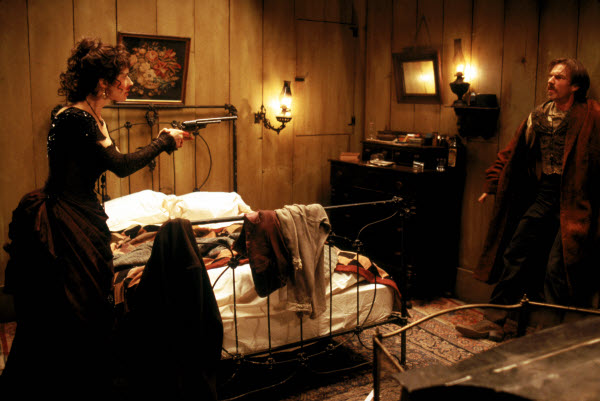
The film treads a broad scope of narrative, from Earp’s farming family background and their move to the West, to his eventual secondment into Law Enforcement and his desire to seek riches in the gold rush near Tombstone, before his legendary confrontation with the Clantons at the OK Corral; the film covers the majority of Earp’s life right through to his eventual “retirement” to Alaska in search of gold, which means a lot of time, and many people, would need to be compressed to make this a workable film. As it is, the film runs some 3 hours, so it’s a bit of a butt-numb-a-thon, but I prefer this kind of biopic over the shorter, more sound-bite friendly Tombstone. The script does a solid job introducing all the relevant characters, and developing the bonds between the Earp’s and their friends the Mastersons, while Dennis Quaid steals every scene he’s in as Doc Holliday. The script feels like a storybook come to life, with something of a mythical sheen overlaid to maintain Earp’s mystique as a cult Western figure, although there’s moments in the movie that could have been shortened or excised altogether and not be missed. Effort has been made to try and humanize Earp as a man, a flawed man with both dark and light to him, and I appreciated Kasdan’s work in this regard. Costner can’t quite muster the performance chops to make it work the entire time, and at times he clunks through his lines and scenes with very little (none) nuance, but overall I think he delivers one of the more complete essayings of the famous lawman to date.
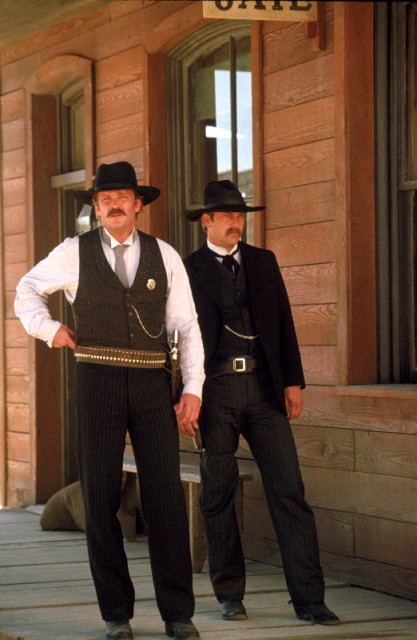
As mentioned, Dennis Quaid nails his role as Holliday, delivering a subtly moving – and often gut-bustingly funny – portrayal of Earp’s erstwhile friend. David Andrews and Linden Ashby, as Wyatt’s younger brothers, support Costner with eminently personable portrayals of the siblings, even if their parts aren’t as potent as big Kev’s. Michael Madsen plays his usual surly self as Virgil Earp (is it just me, or does Madsen always look like’s completely disinterested in being in every film he appears in?), while Tom Sizemore brings his “heavy hitter” attitude to the role of Bat Masterson. With all the testosterone leaping about the screen, the female roles are – unfortunately – something of a thankless task here, although it must be said that being a woman in this era was pretty thankless anyway. You’re either a wife, a potential wife, or a whore, apparently. At least, that’s what these movies show us. Earp’s first wife, Urilla, played by Annabeth Gish, dies from typhoid fever. His second “wife”, a prostitute named Mattie whom Wyatt hooks up with (see what I did there?) ends up trying to kill herself when she realizes that Wyatt doesn’t really love her like she thinks he should. His third wife, Josie (a terrific Joanna Going) seems more like an ingenue than genuine wifey material, although she seems to understand Wyatt’s seemingly harsh exterior and the two remain paired until the very end. However, if there’s a significant issue with the script, it’s the lack of development between Wyatt and these women in any truthful manner. I think it’s more to do with Costner’s stoic portrayal and the somewhat melodramatic scripting of these women, than the performances from the ladies – Mare Winningham’s portrayal of Mattie is heartbreaking but the truth behind her character just seems non-existent, and the motivations for her later actions seem to come out of nowhere – and had there been more effort put towards developing these sidebar plot points, perhaps the effect would be less jarring.
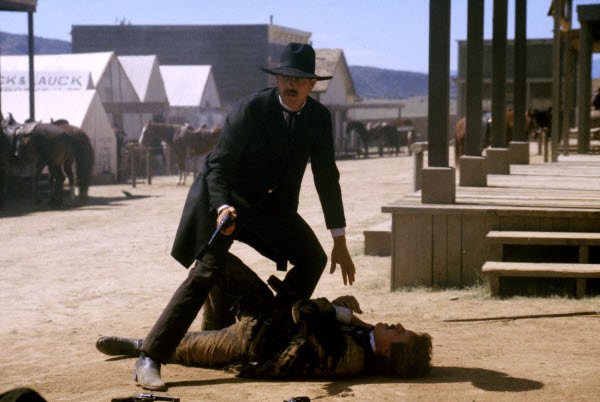
Still, the interplay between the Wyatt and those around him remains disappointingly aloof. It’s like we’re expected to root for Wyatt, but his behavior towards his family and friends makes one want to reach out and slap his damned face at times. Costner’s unable to bring a core truth to Wyatt’s stern, almost brutal exterior, and this limits what he’s able to achieve with the character in the long term. You get the sense that Kasdan and Costner were aiming for “hard-bitten lawman” but ended up with “arrogant wanker with a gun”.
Directorially, there’s little one can say negatively about Kasdan’s work here. He’s competent with the camera, using the scope aspect of the film to deliver some truly iconic shots and imagery to pull you into this living, breathing world of the American West. The dusty cinematography, contrasted with the dry, dusty characters within it, complement each other perfectly. Kasdan draws the tension in each scene with some terrific editing, a sense of scale and grandeur, and a cohesive grasp of how to manage his enormous cast; the film never feels bloated, although it could easily have gone that way, and each scene seems to fit logically within the overall narrative framework – however, several scenes seem a little more ancillary than most, mainly the ones with the female characters bickering over Wyatt and his brothers, although I think this is more to do with Kasdan’s inability to make these moments truly work than anything else. James Newton Howard’s truly epic score, while not especially memorable, is perfectly suited to the story, capturing the freedom of the Old West with the danger and excitement of living in it.
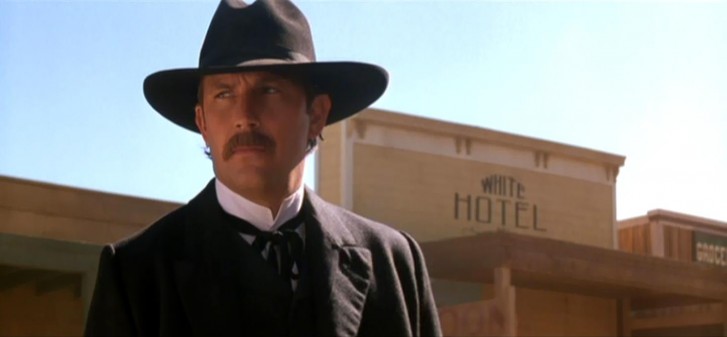
I think Wyatt Earp’s been given an undeserved bad wrap in the years since its release. With the benefit of time and distance from its more pop-culture friendly brother Tombstone, Wyatt Earp is a solidly written, generally well made biopic epic that delivers action and excitement along with the Costner clunkiness we’ve come to find endearing. Sure, the man has the emotional range of a bowl of gazpacho soup, but he knows what audiences want in a ripping, action/adventure film. A tinge of romance, a touch of historical inaccuracy, and the deft hand of a director who obviously loves this material, make Wyatt Earp worth a second look for a quality version of the story of Earp’s legendary life.


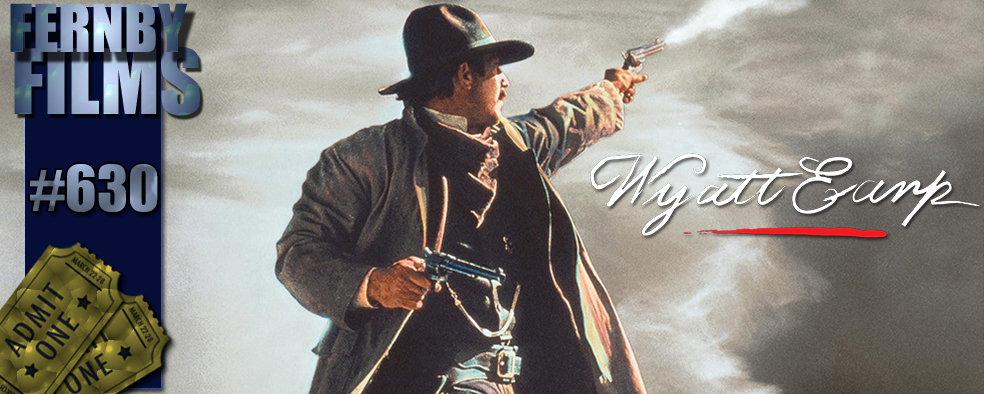
 Wyatt Earp (1994)
Wyatt Earp (1994)
 Old West Day recalls famous Wyatt Earp shootout
Old West Day recalls famous Wyatt Earp shootout





I'm still of the opinion Costner's Open Range is his definitive western. Check it out if you haven't already!!
I hated this movie when it came out, but I was 13 so I didn't much care for slow-paced stuff. Have always wanted to give it a second chance, sounds like it's worth it! I do like Kevin Costner.
My recent post Top 10 1970-1971 Shaw Brothers Martial Arts Films
I'm not saying you'll enjoy it any more or less, Will, but I think with a more adult sensibility you might find more to appreciate about it. I'm a lover of a good western from way back (my father's influence – best ever is Shane!) and I guess means I'm biased towards wanting to like them more than most, so I really enjoyed Wyatt Earp (flawed as it is). I'll be looking forward to your thoughts when you get around to revisiting it!
I was all about westerns growing up too. I still love them to death, although these days I don't watch them all that often. I think I'd definitely like it more now.
My recent post Things to Come (1936)
This film would be really good if it weren't a western. Any chance there'll be "Room in Rome" style remake?
My recent post What a Pisser
Not if you are still expecting Costner to appear….. ewww……
😀